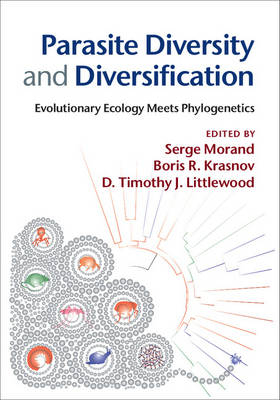
Parasite Diversity and Diversification
Cambridge University Press (Verlag)
978-1-107-03765-6 (ISBN)
The development of molecular tools has dramatically increased our knowledge of parasite diversity and the vectors that transmit them. From viruses and protists to arthropods and helminths, each branch of the Tree of Life offers an insight into significant, yet cryptic, biodiversity. Alongside this, the studies of host-parasite interactions and parasitism have influenced many scientific disciplines, such as biogeography and evolutionary ecology, by using comparative methods based on phylogenetic information to unravel shared evolutionary histories. Parasite Diversity and Diversification brings together two active fields of research, phylogenetics and evolutionary ecology, to reveal and explain the patterns of parasite diversity and the diversification of their hosts. This book will encourage students and researchers in the fields of ecology and evolution of parasitism, as well as animal and human health, to integrate phylogenetics into the investigation of parasitism in evolutionary ecology, health ecology, medicine and conservation.
Serge Morand is CNRS researcher at the Institute of Evolutionary Sciences at the University of Montpellier II, France. His research focuses on the evolutionary ecology of host-parasite interactions and population ecology of parasites and pathogens. He is conducting several projects on the impacts of global changes on the links between biodiversity and health in Southeast Asia, using rodent-borne diseases as a model. He is the co-author of several articles and books on these fields. Boris R. Krasnov is Professor and Head of the Mitrani Department of Desert Ecology in the Jacob Blaustein Institutes for Desert Research at the Ben-Gurion University of the Negev, Israel. He is interested in the various aspects of ecology and evolution of host-parasite relationships. Parasitic fleas on small mammals represent his main study model of parasite-host associations, although he studies some other parasite taxa as well. He is an author of three monographs, editor and co-editor of three collections and author of more than 200 scientific publications. D. Timothy J. Littlewood is a Merit Researcher and currently Head of the Life Sciences Department at the Natural History Museum, London. His main research interests include: the systematics of platyhelminths (flatworms) and other phyla, particularly with a view to revealing evolutionary patterns associated with parasitism; the development and application of molecular tools for species diagnosis, life cycle completion and biodiversity assessment; and mitogenomics and phylogenomics pursued by means of next-generation sequencing.
List of contributors; Foreword; Introduction Serge Morand, Boris Krasnov and Tim Littlewood; Part I. Evolutionary Ecology of Parasite Diversity: 1. Quantifying parasite diversity Robert Poulin; 2. Relationships between parasite diversity and host diversity Boris Krasnov and Robert Poulin; 3. Patterns of diversity and distribution of aquatic invertebrates and their parasites Tommy L. F. Leung, Camilo Mora and Klaus Rohde; 4. Under the changing climate: how shifting geographic distributions and sexual selection shape parasite diversification Lajos Rózsa, Piotr Tryjanowski and Zoltán Vas; 5. Impacts of parasite diversity on wild vertebrates: limited knowledge but important perspectives Frederic Bordes and Serge Morand; Part II. The Evolutionary History of Parasite Diversity: 6. Revealing parasite diversity using brute force molecular techniques and gently persuasive microscopy Aurélie Chambouvet, Thomas A. Richards, David Bass and Sigrid Neuhauser; 7. Evolution of simian retroviruses Ahidjo Ayouba and Martine Peeters; 8. The diversity and phylogeny of Rickettsia Lucy A. Weinert; 9. Advances in the classification of Acanthocephalans: evolutionary history and evolution of the parasitism Martín García-Varela and Gerardo Pérez-Ponce de León; 10. The study of primate evolution from a lousy perspective David L. Reed, Julie M. Allen, Melissa A. Toups, Bret Boyd and Marina Ascunce; 11. Host correlates of diversification in avian lice Lajos Rózsa and Zoltán Vas; 12. Evolutionary history of Siphonaptera: fossils, origins, vectors Katharina Dittmar, Qiyun Zhu, Michael W. Hastriter and Michael F. Whiting; 13. Bat fly evolution from the Eocene to the present (Hippoboscoidea, Streblidae and Nycteribiidae) Katharina Dittmar, Solon F. Morse, Carl W. Dick and Bruce D. Patterson; 14. The evolution of parasitism and host associations in mites Ashley Dowling; 15. Nematode life-traits diversity in the light of their phylogenetic diversification Serge Morand, Steve Nadler and Arne Skorping; 16. Phylogenetic patterns of diversity in the cestodes and trematodes Timothy J. Littlewood, Rodney A. Bray and Andrea Waeschenbach; 17. Patterns of diversification in the parasites of Caribbean Anolis lizards Bryan G. Falk and Susan L. Perkins; Part III. Combining Ecology and Phylogenetics: 18. Comparative analysis – recent developments and uses with parasites Yves Desdevises, Serge Morand, Boris R. Krasnov and Julien Claude; 19. Phylogenetic signals in ecological properties of parasites Boris R. Krasnov, Serge Morand and Robert Poulin; 20. Parasite species coexistence and the evolution of the parasite niche Andrea Šimková and Serge Morand; 21. A community perspective on the evolution of virulence Hadas Hawlena and Frida Ben-Ami; 22. Host-specificity and species jumps in fish-parasite systems Maarten P. M. Vanhove and Tine Huyse; 23. When is cophylogeny evidence of coevolution? Timothée Poisot; 24. Bringing together phylogenies and behaviour in host-parasite interactions Tania Jenkins and Philippe Christe; 25. The evolutionary epidemiology of the Hepatitis C virus Peter V. Markov, Rebecca R. Gray, James Iles and Oliver G. Pybus; Conclusion and perspectives Armand Kuris; Index.
| Erscheint lt. Verlag | 26.2.2015 |
|---|---|
| Zusatzinfo | 15 Tables, black and white; 50 Halftones, unspecified; 15 Line drawings, unspecified |
| Verlagsort | Cambridge |
| Sprache | englisch |
| Maße | 181 x 253 mm |
| Gewicht | 1130 g |
| Themenwelt | Naturwissenschaften ► Biologie ► Evolution |
| Naturwissenschaften ► Biologie ► Mikrobiologie / Immunologie | |
| Naturwissenschaften ► Biologie ► Zoologie | |
| ISBN-10 | 1-107-03765-4 / 1107037654 |
| ISBN-13 | 978-1-107-03765-6 / 9781107037656 |
| Zustand | Neuware |
| Haben Sie eine Frage zum Produkt? |
aus dem Bereich


